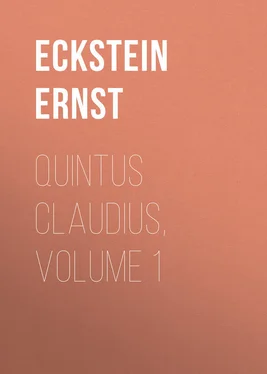Ernst Eckstein - Quintus Claudius, Volume 1
Здесь есть возможность читать онлайн «Ernst Eckstein - Quintus Claudius, Volume 1» — ознакомительный отрывок электронной книги совершенно бесплатно, а после прочтения отрывка купить полную версию. В некоторых случаях можно слушать аудио, скачать через торрент в формате fb2 и присутствует краткое содержание. Жанр: foreign_antique, foreign_prose, на английском языке. Описание произведения, (предисловие) а так же отзывы посетителей доступны на портале библиотеки ЛибКат.
- Название:Quintus Claudius, Volume 1
- Автор:
- Жанр:
- Год:неизвестен
- ISBN:нет данных
- Рейтинг книги:4 / 5. Голосов: 1
-
Избранное:Добавить в избранное
- Отзывы:
-
Ваша оценка:
- 80
- 1
- 2
- 3
- 4
- 5
Quintus Claudius, Volume 1: краткое содержание, описание и аннотация
Предлагаем к чтению аннотацию, описание, краткое содержание или предисловие (зависит от того, что написал сам автор книги «Quintus Claudius, Volume 1»). Если вы не нашли необходимую информацию о книге — напишите в комментариях, мы постараемся отыскать её.
Quintus Claudius, Volume 1 — читать онлайн ознакомительный отрывок
Ниже представлен текст книги, разбитый по страницам. Система сохранения места последней прочитанной страницы, позволяет с удобством читать онлайн бесплатно книгу «Quintus Claudius, Volume 1», без необходимости каждый раз заново искать на чём Вы остановились. Поставьте закладку, и сможете в любой момент перейти на страницу, на которой закончили чтение.
Интервал:
Закладка:
“Two days, not more,” replied Chrysostomus.
“Aphrodite Euploia be most fervently thanked!”
“What are you talking about? Who is that you are blessing?”
“To be sure, my good Chrysostomus,” replied the other with a triumphant smile, “I was forgetting that a seaman from the land of the Gauls is not likely to understand Greek. Euploia, being interpreted, means the goddess who grants us a good voyage. Do not take my observation ill, but surely you might have picked up so much Greek as that in the course of your many voyages with the lamented father of our lord Aurelius.”
“Silly stuff!” retorted Chrysostomus. “Besides, I never sailed in the Greek seas. Ten times to Ostia, eight times to Massilia, 18 18 Massilia. An important city founded by the Greeks on the southern coast of Gaul, now called Marseilles.
twelve times to Panormus and a score of times northwards to the seas of the Goths up by the land of the Rugii 19 19 Rugii. A German race occupying a considerable part of the coast of the Baltic – the present Pomerania and island of Rügen.
– that is the sum total of my annals. But Latin is spoken everywhere; even the Frisii 20 20 Frisii. A German race settled in the northern part of what is now Holland and farther east beyond Ems ( Amisia ).
can make themselves understood more or less in the language of Rome; among the Rugii, to be sure, we talked in Gothic.”
“A poor excuse!” said Herodianus pathetically. “However I have talked till I am thirsty! I will be on the spot again when the master appears.”
He carefully replaced his little ivory map in the bosom of his under-garment, and was about to withdraw, when a tall youth, followed by two or three slaves, appeared on the steps from below. The ship’s crew hailed their master with a loud shout, and Caius Aurelius, thanking them for their greeting, went forward while the slaves prepared breakfast 21 21 Breakfast. The first meal after rising was called jentaculum . In the time of the republic (and still later among the poorer classes) it consisted principally of pulse. Among the wealthy luxury intruded even here; but in comparison with the second breakfast ( prandium ) and especially with the principal repast ( coena ) the jentaculum always remained frugal.
under an awning over the cabin roof; only one of them followed him.
It was by this time broad daylight; the whole eastern sky glowed with flame behind the blue Campanian hills, a light breeze curled the no less glowing sea into a thousand waves and ripples, and the prow of the galley, which was decorated with a colossal ram’s-head 22 22 Ram’s-head at the prow. These ornaments were usually carved in wood on the prow. They must not be confounded with the ship’s beaks ( rostra , ἕμβολα). These beaks – two strong iron-cased beams – were on the fore-part of the ships of war and also on vessels intended for long voyages, where they would be exposed to danger from pirates. They were beneath the surface of the water, and were destined to bore holes in the enemy’s ships. See vol. 2, Chap IX.
in brass, threw up the water in sparks of liquid gold. The palace of Tiberius on the top of the rocky isle seemed caught in sudden fire, at every instant the glory spread lower, kindling fresh peaks and towers, and up rose the sun in all the majesty and splendor of his southern might from behind the heights of Salernum.
Herodianus, who had taken his place officiously close to his master, appeared to promise himself immense satisfaction in interpreting the young man’s mood of devout admiration by a long quotation of Greek poetry. He had already thrown himself into a pathetic attitude and laid his finger meditatively on his cheek, when Aurelius signed to him that he wished to be left undisturbed. The freedman, somewhat offended, drew back a step or two while Aurelius, standing by the side of his favorite slave Magus, 23 23 Magus. A Gothic word – (not the Latin Magus , Greek μάγος – magician, sorcerer,) – means a boy, or knave in the old sense of servant.
who preserved a discreet silence, leaned over the bulwark for a long space lost in thought, letting his eye wander over the open sea and linger for a while on the fantastic shapes of the rocks and mountains, which constantly shifted in form and grouping as the swift galley flew onwards.
Capreae was already on their right hand, and the broad bay of Parthenope, 24 24 Parthenope. The ancient name of Naples, from the siren Parthenope, who is said to be buried there.
with its endless perspective of towns and villas, opened before them like a huge pearly shell; the dark ashy cone of Vesuvius 25 25 Vesuvius. The famous eruption, which buried the three cities mentioned, took place A.D. 79, that is, sixteen years before the commencement of this story.
stood up defiantly over the plain where, a short time since, it had engulfed the blooming towns of Herculaneum, Pompeii and Stabiae. Now there rose from its summit only a filmy cloud of smoke, ruddy in the light of the mounting sun. Farther on, the quays of Puteoli were discernible, the stately buildings of Baiae 26 26 Baiae, now Baja, the most famous watering-place of ancient times. See Horace, Ep. I, 1, 83.
and the islands of Aenaria and Prochyta. 27 27 Aenaria and Prochyta, now Ischia and Procida.
On the left hand the distance was unlimited; vessels laden with provisions from Alexandria 28 28 Alexandria in Egypt was, in point of commerce, the London of ancient times.
and merchant-ships from Massilia slowly crossed the horizon like visions; others, with every sail set, flew across the bay to disembark their precious freight in the emporium of Puteoli, whence it would be carried to lay at the feet of Rome, the all-absorbing and insatiable mistress of the world.
Meanwhile the slaves had laid the table under the awning with fine cloths, had arranged couches and seats and strewn the spot with a few flowers, and were now standing ready to serve the morning meal at a sign from their young master. The weary night-rowers had half an hour ago been relieved by a fresh crew, and the fine boat flew on with double rapidity, for a fresh breeze had risen and filled the sails. In an instant the whole face of the waters had changed, and as far as the eye could reach danced crest on crest of foam.
Aurelius wrapped himself more closely in his Tarentine travelling-cloak 29 29 Tarentine travelling-cloak. The woollen stuffs from Tarentum, now called Taranto, were famous.
and involuntarily glanced at Magus, the Gothic slave who stood by his side; but Magus did not seem to see his master’s look, he was gazing motionless and with knitted brows in the direction of Baiae. Then he shaded his eyes from the glare with his right hand.
“ Hva gasaihvis. 30 30 "Hva gasaihvis?“ – ”Gasaihva leitil skip." Literally: What do you see? (I) see (a) little ship. The earliest existing specimens of Gothic date from several centuries later than the time of this story, namely the period when the Goths left their original settlements on the lower Vistula and settled farther to the southeast on the Black Sea. I thought it permissible, however, to make a Goth of the first century speak the language of Ulfilas, since there is nothing against it in the general analogies of language, and Gothic, in the form in which it remains to us, is so concrete and logical in its structure, that it is hardly credible that it should have varied to any great extent within a period of two or three centuries.
What do you see?” asked Aurelius, who sometimes spoke in Gothic to the man.
“ Gasaihva leitil skip κύβιον,” answered the Goth. “A little boat out there not far from the point. If it is the same in your southern seas, as in our northern ones, these good folks would be wise to get their cockleshell to shore as fast as may be. When the sea is covered with eider-down in such a short time, it generally means mischief.”
Читать дальшеИнтервал:
Закладка:
Похожие книги на «Quintus Claudius, Volume 1»
Представляем Вашему вниманию похожие книги на «Quintus Claudius, Volume 1» списком для выбора. Мы отобрали схожую по названию и смыслу литературу в надежде предоставить читателям больше вариантов отыскать новые, интересные, ещё непрочитанные произведения.
Обсуждение, отзывы о книге «Quintus Claudius, Volume 1» и просто собственные мнения читателей. Оставьте ваши комментарии, напишите, что Вы думаете о произведении, его смысле или главных героях. Укажите что конкретно понравилось, а что нет, и почему Вы так считаете.












